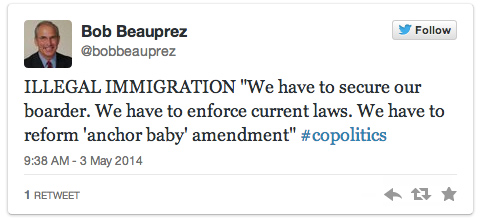 May 04, 2014 11:28 AM UTC
May 04, 2014 11:28 AM UTC
As live-Tweeted by the Bob Beauprez campaign from yesterday's GOP gubernatorial primary debate:

Keeping up a trend we've seen a lot lately, Beauprez's campaign deleted this Tweet some hours later. We suppose it might have been due to the misspelling of "border," which saw some lampooning after it was Tweeted, but the "anchor baby" stuff went out with the proverbial bathwater.
To be clear, the "anchor baby amendment" is more correctly known as the 14th Amendment, which covers a lot more than so-called "anchor babies." Tom Tancredo was once again a no-show for yesterday's debate–but no worries, Tancredo's hard-line action plan for "anchor babies" and other brown people, which as we all know is exactly what Republicans need to win over Colorado's Latino voters, was ably represented by Bob Beauprez.
But for perhaps the first time ever, we do agree with Beauprez about one thing: something has got to be done about these infuriating boarders flattening mogul runs, bulldozing everybody's fresh powder, and generally acting like damned hooligans. If Beauprez runs on a campaign of finally dealing with Colorado's out-of-control boarder problem, he might actually scare up some votes for that.
Subscribe to our monthly newsletter to stay in the loop with regular updates!
Comments